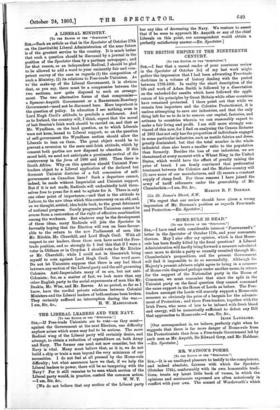THE BRITISH EMPIRE IN THE NINETEENTH CENTURY.
[TO THE EDITOR OF THE "SPECTATOR.") SIR,—I fear that a casual reader of your courteous review in the Spectator of October 3rd of my last work might gather the impression that I had been advocating Free-trade doctrines in a volume of history dealing with the period between 1793-1806. In reality the short description of the life and work of Adam Smith is followed by a dissertation on the unlooked-for results which have followed the appli- cation of his principles by Great Britain while other countries have remained protected. I there point out that while we remain free importers and the Colonies Protectionist, it is useless attempting to save our industries, and that the only thing left for us to do is to remove our capital, factories, and artisans to countries wherein we can reasonably expect to make a fair living and profit. I am still more strongly con- vinced of this now, for I find on analysing the Census Returns of 1901 that not only has the proportion of individuals engaged in some particular industries, such as textile fabrics and dress, greatly diminished, but that the total number in the whole industrial class also bears a smaller ratio to the population than formerly. Besides the loss of our industries, we are threatened at every moment with a Wheat Ring in the United States, which would have the effect of greatly raising the price of bread. I am firmly convinced that preferential treatment between the Colonies and the Mother-country will (1) save some of our manufactures, and (2) ensure a constant supply of cheap food. For these reasons I have joined the army of tariff reformers under the generalship of Mr. Chamberlain.—I am, Sir, &C.,
[We regret that our review should have given a wrong impression of Mr. Dorman's position as regards Free-trade and Protection.—En. Spectator.]






















































 Previous page
Previous page